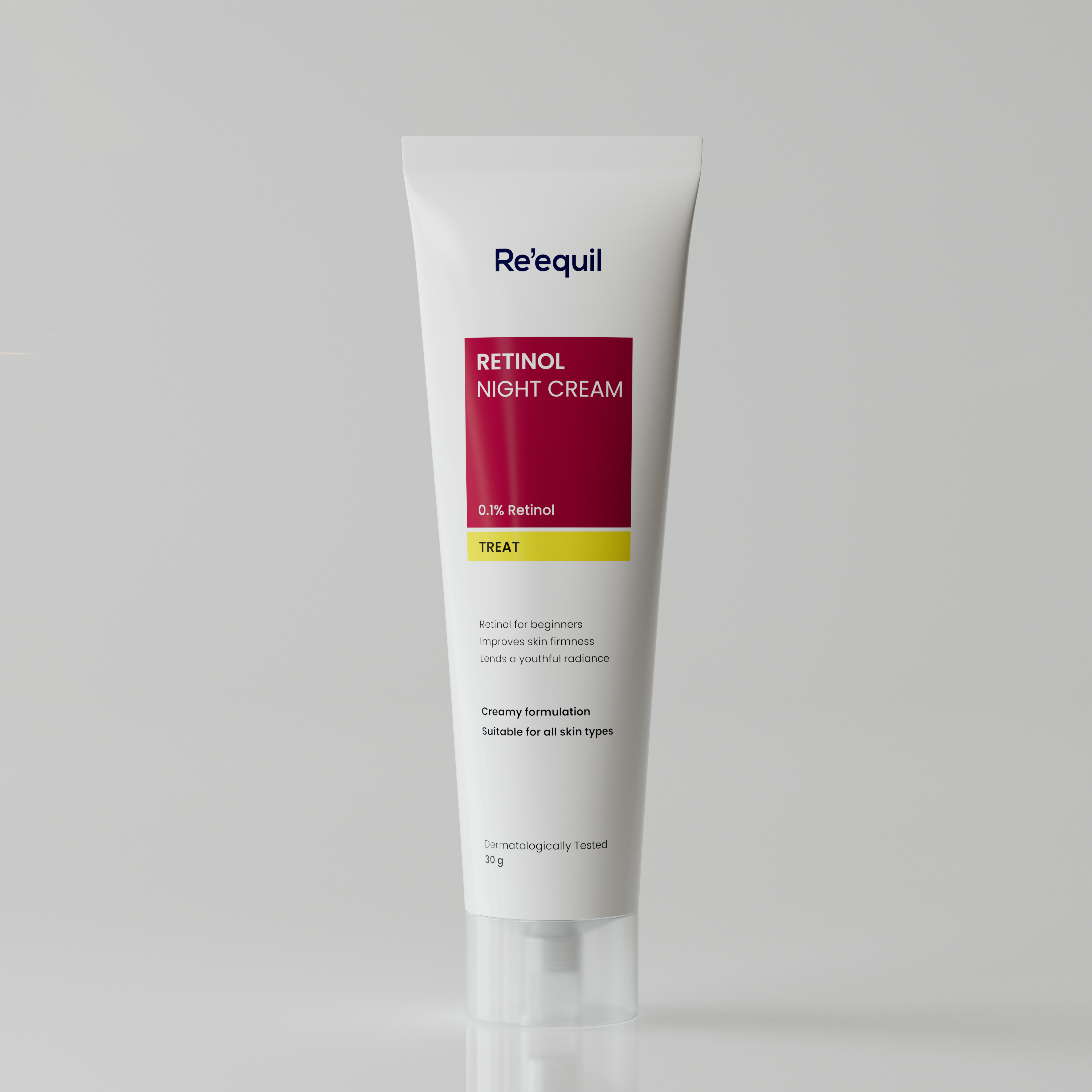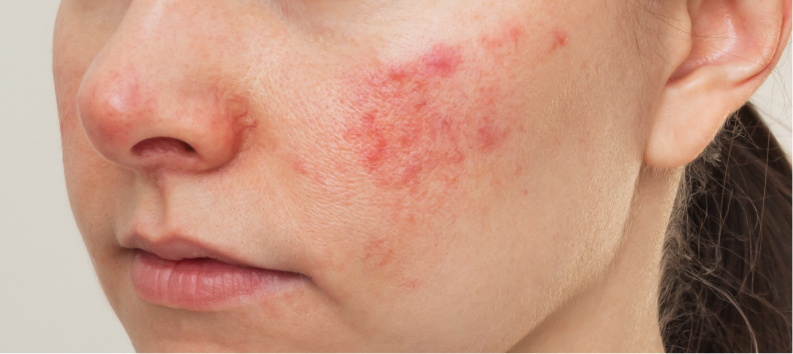Does your red and flushed skin make you feel embarrassed?
Maybe your skin is trying to tell you something.
But, what is it?
Is it something you ate, something you applied on your face or a skin disease you are unaware of?
We get it—finding what caused your face to act all angry can be difficult.
In this post, we will discuss various factors that trigger facial redness, from common culprits like over-exfoliation and sun damage to underlying skin conditions such as rosacea and eczema.
We will also talk about preventive measures to keep facial redness at bay, including lifestyle and dietary changes.
So keep reading to find a solution for a calmer, even-toned skin.
Why is my face red all of a sudden?
There is not one root cause. Red or flushed skin can occur due to several reasons. Once you identify the cause—it will be easier for you to find the solution.
Here are 5 general reasons for facial redness.
1. Over exfoliation
Exfoliation is an essential part of our skincare routine. However, if you over-exfoliate, it can turn your skin red and itchy.
As a general rule, you should not exfoliate your skin more than twice a week—especially if you have sensitive or dry skin.
The objective of exfoliation is to increase cell turnover without damaging your skin.
Whereas, over-exfoliation can strip your skin cells and even remove your skin’s natural barrier—leaving your skin dehydrated and red.
Solution: Apply a moisturiser with hydrating ingredients like ceramide or hyaluronic acid—this will help you restore your skin’s natural barrier.
2. Acne or scarring
When hair follicles are blocked and infected by bacteria, the infected area becomes inflamed and emerges on your skin as red spots.
These red spots are the first stage of acne (known as comedonal) that eventually become papules, pustules, and cysts.
Moreover, facial redness can also be caused by acne scars. If you have cysts or any other type of acne, your skin is likely to be uneven and itchy.
Depending on your skin type or tone, the scarring can be red, pink or brown. Note that scarring is not permanent, it usually fades in some time—and can be faster if you use the right skincare product.
3. Sun damage
Fibres that are supposed to keep your blood vessels tight (thus not visible on the skin) while simultaneously pumping blood from one area to another are broken down by the harmful UV rays.
As a result, your blood vessels are enlarged, resulting in the visibility of red, spidery veins around your cheeks and nose.
Solution: always wear a broad spectrum SPF 50 sunscreen regardless of the weather and season.
4. An allergic reaction
Redness on your face can be due to an allergic reaction to food or a skincare product.
Or, if you have recently started using any potent skincare ingredient such as Retinol, AHA or BHA—redness on the face is a common adverse reaction—and fortunately, temporary.
Identify the food items you are allergic to and learn the right application/frequency of using the potent skincare ingredients.
5. Alcohol consumption
Alcohol flush reaction, a type of alcohol intolerance, is when a person sensitive to alcohol struggles to process the toxins (acetaldehyde) present in alcohol.
As a result, the blood vessels on the face are enlarged—causing redness and swelling.
Can redness on my face be linked to any skin disease?
Yes, other than the general reasons mentioned above, redness on your face may be linked to several skin diseases. Here are they -
Rosacea
Rosacea is a common inflammatory skin condition, affecting up to 20% of the population. The symptoms come and go, usually on the cheeks and nose, here are they -
- Facial redness
- Rash
- Visible blood vessels
- Skin thickening
- Eye irritation
A study suggests that spending more time in the sun or due to emotional stress can increase the adverse effects of Rosacea.
Eczema
Eczema causes itching, rashes, dry patches, and potential infections. It falls under dermatitis, a category of conditions that can inflame or irritate the skin, with the most common type being atopic dermatitis.
Here are the symptoms of Eczema -
- Redness on face
- Severe dryness
- Cracked or leathery skin
Psoriasis
Psoriasis is a lasting skin condition where the immune system gets too active, making skin cells grow too fast. This leads to scaly and inflamed patches, usually on the scalp, elbows, knees and other parts of the body as well.
Symptoms of Psoriasis -
- Patches of thick, red skin with silvery-white scales that itch or burn
- Dry, cracked skin that itches or bleeds
- Poor sleep quality
Contact Dermatitis
Contact dermatitis is a skin rash that occurs when you encounter something you're allergic to or that irritates your skin. The rash may swell and cause itching and discomfort.
Symptoms of Contact dermatitis -
- Red to purple or darker than your natural skin tone.
- Swollen skin
- Bumpy skin that can emerge as pimples
- Painful with a burning or stinging sensation
- Flaky, itchy, and scaly
How can I prevent the redness on my face?
Skin redness can be long-lasting. The best way to counter this is to stop it from happening in the first place. Here are some common ways -
Avoid alcohol consumption, or at least, over-consumption
As mentioned above, alcohol consumption can cause facial redness. If you can, avoid drinking completely or limit the consumption.
The way it works is that your body converts alcohol into acetaldehyde, a toxic molecule. Following that, your body converts acetaldehyde into non-toxic molecules by an enzyme called aldehyde dehydrogenase.
And if you are intolerant to alcohol or have over-consumed it, the whole alcohol metabolism process above will not be executed efficiently. As a result, there will be skin flushing and other side effects like skin redness.
Do not skip your sunscreen
A 2017 study says that -
“Rosacea-prone sensitive skin requires a high sun-protection factor (SPF 50+ lotions)."
The study enrolled 44 individuals who showed signs of Erythema (redness on skin due to inflammation) and scaling.
They all were instructed to apply a sunscreen SPF 50+ lotion during the day for 21 consecutive days.
On the 22nd day, individuals dealing with redness on their faces reported a significant improvement.
Here are some more improvements reported by the individuals -
- Less skin irritation
- Helped with the sun-provoked facial redness
- Did not worsen Rosacea
Another study in 2020 emphasized the promotion of sunscreen as a crucial method for preventing skin cancers, sunburn-induced redness, and skin photoaging.
Make changes to your daily habits
Dealing with ongoing redness can be bothersome, and it's not always just a skin issue. This implies that fixing it might involve making specific changes to your daily habits, such as:
- Decreasing sun exposure
- Less consumption of spicy foods and hot drinks
- Avoiding hot baths
- Avoiding potent skincare ingredients
- Quitting smoking
Change your diet
A 2021 study found that dietary changes can make significant improvements in facial redness.
Try to avoid the following foods -
- Heat-related foods: Garlic and onions
- Capsaicin-related foods: kimchi, salted seafood, red pepper paste, and many other processed foods.
- Cinnamaldehyde-related food: Spices and peppers (such as hot sauce).
RELATED - Top 10 Foods For Glowing Skin—You Will Be Surprised To Know
Use skincare products with hydrating ingredients
Skincare products such as moisturisers with hydrating ingredients improve and maintain the skin barrier, which prevents dry skin.
A study in 2018 says that the topical application of Ceramide can increase skin hydration, treat skin irritation and reduce facial redness.
Talk to a dermatologist
If you've tried other options and still can't alleviate redness or flushing, it's advisable to consult your dermatologist, especially if redness is accompanied by additional symptoms like scaling, severe itching, and redness on other parts of the body.
Home remedies vs skincare products: which is better for facial redness?
You can try tackling facial redness with either home remedies or over-the-counter skincare products, each has its own benefits.
Home remedies are natural and gentle, ideal for individuals with sensitive skin. Especially, aloe vera gel, which can be made easily at home, is very soothing—and is proven to treat rosacea and eczema.
Whereas, skincare products have a scientific punch—formulated by science-backed ingredients to target facial redness. Moreover, with so many options available, you can find the right ingredients as per your skin type and the severity of redness on your face.
So which one is better for you?
Honestly, the key is that -
- If you have mild redness on your face, it’s best to begin with a few home remedies.
- But, in case you have chronic facial redness, it’s best to contact your dermatologist to find the right skincare ingredients for yourself—that can provide optimum results with the least chance of side-effects or exacerbating the redness.
Here are some choices for both -
Home Remedies
- Honey
- Chamomile Tea bags
- Lavender Oil
- Coconut Oil
- Yoghurt
Skincare ingredients
- Salicylic Acid
- Niacinamide
- Azelaic Acid
- Vitamin C
- Ceramide
- Hyaluronic Acid
I need to get rid of facial redness overnight. What should I do before sleeping?
Reducing facial redness is not possible–the treatment requires a commitment of weeks to months. However, if you have mild redness on your face due to acne, an allergic reaction or overconsumption of alcohol, these 3 hacks may help you.
Apply a cool compress
Let’s assume that the redness on your face is not connected to any skin disease. Instead, it is an outcome of extensive exercise, alcohol, or any other reason—in this case—applying a cool compression on the face can be really effective. It can be as simple as massaging your face with an ice cube.
Or, you can dip your face in a bowl full of ice and water—a skincare practice followed by many celebrities to reduce puffiness.
Hydrate yourself
Drinking water can surely reduce the redness on your face. Adequate water intake aids in eliminating toxins from your body that are often trapped in the skin's pores. Such toxins are generally trapped in your skin’s pores, which eventually increases the chances of Rosacea—and breakouts as well.
Apply a soothing, serum-based face mask
Apply a sheet mask or even homemade natural face masks to soothe the red skin. Doing so will prevent the contraction of blood vessels, which generally results in dryness and irritation.































